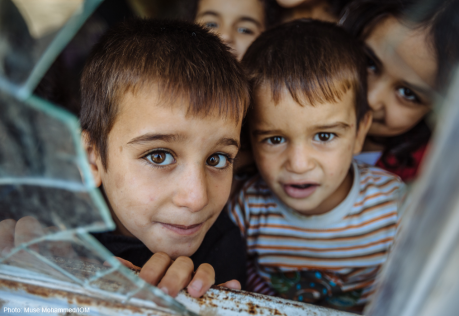Beyond Territorial Asylum: Making Protection Work in a Bordered World

MPI and the Robert Bosch Stiftung have launched this three-year initiative, begun in April 2021, to address these challenges and to seize the opportunity to explore new ways to facilitate access to protection that better support equity and result in more flexible, sustainable infrastructure. Through research, consultations, and convenings, the initiative is advancing creative, effective alternative approaches to providing access to protection that can be adapted to particular contexts around the globe. In the process, the initiative aims to preserve protection norms by shoring up public trust and political confidence in the asylum and refugee resettlement systems.
An Advisory Group, comprised of leading protection advocates, policymakers, migration researchers and academics, and civil society from regions around the world, are engaged in the initiative's work. (For a list of Advisory Group members, click here.)
Research published under the auspices of the initiative is collected here.
REPORT: The Mobility Key: Realizing the Potential of Refugee Travel Documents
Travel documents are critical facilitators of mobility. But for refugees, who cannot safely use a passport issued by their origin country, the lack of a usable travel document can shut them out of work, study, or other opportunities beyond their first country of asylum. This policy brief examines alternative documents that can facilitate refugees’ movement, key barriers to acquiring them, and strategies for overcoming these challenges.
REPORT: Expanding Protection Options? Flexible Approaches to Status for Displaced Syrians, Venezuelans, and Ukrainians
The massive and rapid displacement of Syrians, Venezuelans, and Ukrainians presented neighboring countries with an impossible task: providing legal status and assistance, even though their asylum systems lacked the capacity to handle such a large influx. This report examines the costs and benefits of the flexible approaches taken to providing status in these three cases, identifying lessons for future crises.
COMMENTARY: Achieving Meaningful International Cooperation on Displacement: Can the 2023 Global Refugee Forum Deliver?
The 2023 Global Refugee Forum will test whether global solidarity for refugees and their hosts can be revived as the political environment cools in many countries. With responses to major displacement crises since 2019 largely taking place outside forum and Global Compact on Refugees processes, preserving the relevance of the forum and the compact will require going beyond counting pledges in Geneva, as this commentary explains.
REPORT: Building Meaningful Refugee Participation into Protection Policymaking
One promising—but often underutilized—element of addressing the world’s urgent humanitarian protection needs is meaningfully engaging refugees in policymaking processes. As this report highlights, consultations, advisory roles, and leadership and staff positions can help ensure refugees’ knowledge and expertise are reflected in policy responses to displacement. The study also examines common limitations and ways to make engagement more impactful.
REPORT: External Processing: A Tool to Expand Protection or Further Restrict Territorial Asylum?
As asylum systems in many countries have come under considerable strain in recent years, there has been renewed interest in external processing—that is, conducting part or all of an asylum procedure outside a destination country’s territory. Some countries have pursued this to deter spontaneous arrivals, but as this report explores, others are using various external processing models to expand access to protection
REPORT: Rebooting the Asylum System? The Role of Digital Tools in International Protection
There has been a flurry of digital activity in the asylum field since the COVID-19 pandemic temporarily halted protection operations, and it has led officials to rethink how everything from registration to case adjudication happens. But what does this increasing use of technology mean for the people and processes involved? This report explores this question, as well as the challenges of balancing technology’s potential benefits with measures to mitigate its risks.
COMMENTARY: The Ukrainian Conflict Could Be a Tipping Point for Refugee Protection
Recent displacement crises—ranging from Syria, Afghanistan, Venezuela, Myanmar, South Sudan, to most recently Ukraine—have imposed huge stresses on the humanitarian protection regime. Yet individual countries and regional organizations have been innovating to meet the challenge and expand the options available for protection, in some cases bypassing beleaguered asylum systems. This commentary traces the rise of more ad hoc approaches.
REPORT: From Fear to Solidarity: The Difficulty in Shifting Public Narratives about Refugees
Public opinion of refugees and asylum seekers is often portrayed as a binary, reflected in stories of them as “threats” or “benefits.” Yet in reality, people can hold a variety of competing beliefs and concerns about forced migrants and their impacts on society. This report explores these different narratives, the contexts in which they flourish, and the types of initiatives that have been used to try to boost solidarity and ease tensions.
COMMENTARY: The Refugee Convention at 70: What Does the Future Hold in an Increasingly Bordered World?
How can the 1951 Refugee Convention be reinvigorated, and new approaches simultaneously developed, to make humanitarian protection work in the 21st century? This joint Bosch Stiftung-MPI commentary explains.

